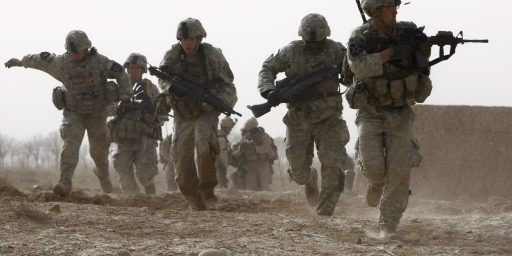OTB Roundtable: Afghanistan (James Joyner)
Unlike Dave, I supported the invasion of Afghanistan as a response demanded by the 9/11 attacks, which had been perpetrated by al Qaeda under the auspices of the Taliban government, which had been giving them aid and comfort. Indeed, I was outraged that the Bush Administration waited several days; I’d have ordered strikes immediately.
My war aims, however, would have been much more modest than the Bush Administration’s: ousting the Taliban, installing a temporary regime, hunting down and killing as many al Qaeda leaders as possible, and offering some support in affecting the transition to a permanent, legitimate government. Instead, of course, the last administration articulated a wildly ambitious strategy of democratizing Afghanistan and rendering it permanently stable — while at the same time treating it as the bastard stepchild to the equally implausible plan to turn Iraq into a shining city on a hill that would persuade citizens of regional states to rise up and overthrown evil regimes.
Alas, President Obama hasn’t been any better. He campaigned on a platform that Bush had taken his eyes off the ball in Afghanistan and that we should exit Iraq, the unnecessary war, to double down on winning a war everybody agreed must be won.
A funny thing happened: Iraq morphed into something that could plausibly be called close enough to victory while Afghanistan got ever more complicated. Because of the campaign declarations, however, Obama could not walk away. Further, he fired a perfectly competent commander, David McKiernan, to replace him with Stanley McChrystal, whom he anointed a guru of counterinsurgency. McChrystal actually believes the war winnable and backed the president into a corner of his own making, drafting a plan that required massively more troops and a lengthy time commitment. Obama gave him the former while simultaneously announcing that phased withdrawal would begin in July 2011.
My strong guess is that Obama and his senior advisors think that the effort in Afghanistan is Quixotic and want to get out as soon as politically feasible. The “Afghan Surge” was a cynical political gesture to prevent charges from the Right that the president is weak on terrorism that allows Obama to say he gave it his best shot and that our Afghan partners let us down. Come next summer, he fully intends to start bugging out, hopefully with some fig leaf that can tepidly be called close enough.
In terms of my own policy preferences at this point, I’m rather torn. My pure Realist instinct is that we should have left some time ago. Afghanistan will never be Sweden or, indeed, Pakistan. At the same time, however, we’ve made strong commitments to parties in Afghanistan, many of whom have already died in the effort and many others who will have to bug out or be killed the second we’re no longer there to protect them.
In terms of our national security objectives, al Qaeda is largely defeated in Afghanistan, with the rump of the decimated leadership in the ungoverned areas of Pakistan. The Taliban are, in my judgment, not portable.
So, the least bad case exit strategy is to start withdrawal next summer, be generous in granting asylum to those we’ve made promises to, and do what we can to lend technical and financial support to the Afghan people to hold off the re-radicalization of the government.
And I’ve never understood the objections to “whack-a-mole,” which strikes me as a much preferable alternative to indefinite occupation.
The rest of the series:







Seriously? A victory?
Are you an Iranian and I never noticed?
Iraq is a majority Shia country, so a Democratic Iraq was always going to be much closer to Iran.
Same here. Come to think of it, if we’d successfully captured and/or killed Bin Laden at Tora Bora back in 2001, most of what followed after – the Afghan and Iraqi occupations – probably would have never happened. Having killed “the bad guy”, we probably would have done what you suggested, James.
Brett, that’s an interesting counterfactual. I’m not sure if we captured/killed Bin Laden at Tora Bora in 2001 that it would have obviated much of what followed. I don’t believe the Great Man theory that would make Bin Laden’s removal the accomplishment of our strategic goals. But I do think it would make withdrawal easier and more respectable once the Taliban was defeated and a new Afghan government was put in place. So perhaps I agree in the longer term.
OTOH, the shorter, more decisive the victory in Afghanistan, the more likely Iraq became. (Just as the more successful Iraq appeared at first, the less interest in working with Iran became)
The problem with Afghanistan is Iraq. While I’ve never been a supporter of either war I did at least feel that there was at least some purpose and legitimacy to the Afghan war when it first began. Our mistake was in allowing our country to become sidetracked by the Bush administration’s completely illegitimate Iraqi Crusade.